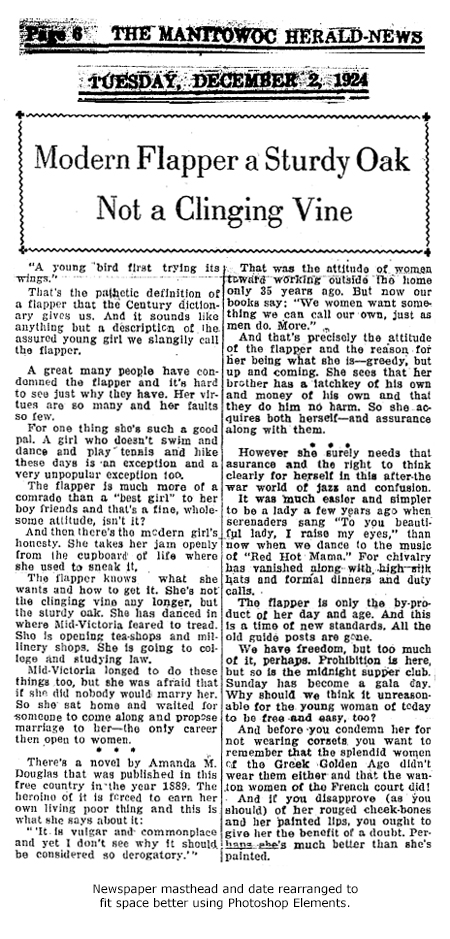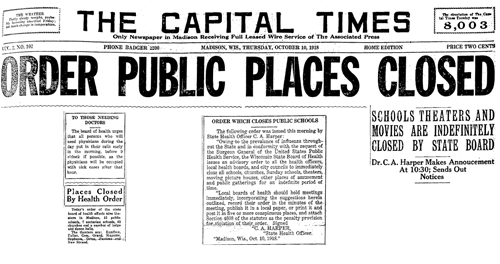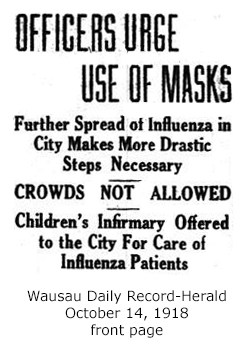Wikipedia traces flapper attitudes to a triangle of causes: World War I's carnage, the 1918 flu pandemic, and American women winning the right to vote in 1920.14 (My mother's mom [called "mum," the same name we called our mother] was born in 1885 and prohibited from voting until she was 35.) The war and flu "inspired in young people a feeling that life is short and could end at any moment" concludes Wikipedia.15
My mother was 11 when the flu pandemic began in January, 1918, and 14 when it ended in December, 1920. She never forgot the sickness and death it caused in her area and talked about it throughout her life.
C.A. Harper, Wisconsin health officer at the time, ordered "schools, churches, Sunday schools, theaters, moving picture houses, other places of amusement..." closed immediately as a way of preventing the flu from spreading.16
The Wausau Daily Record-Herald ran a front page article a few days later titled, "Officers Urge Use of Masks" with the subhead "Further Spread of Influenza in City Makes More Drastic Steps Necessary." 17 My mother recalled homes in her area were quarantined to prevent the virus' spread.
A February 6, 1919 story summarized the death toll during the autumn of 1918 in Wisconsin alone: "The influenza epidemic took 7,236 Wisconsin lives in October, November, and December, as ascertained by the bureau of vital statistics from reports of local registrars." 18
Prohibition of alcoholic beverages, in place from January 1920 through December 1933 was the power plant of the Roaring Twenties;19 it caused widespread lawlessness and moved everyday activities behind closed doors. A Stanford University website states: "According to novelist F. Scott Fitzgerald, during Prohibition, 'The parties were bigger...the pace was faster...and the morals were looser." 20 Mobility provided by mass public transit and automobiles gave the decade a new and exciting pace.
A December 2, 1924 essay in Wisconsin's The Manitowoc Herald-News titled, "Modern Flapper a Sturdy Oak, Not a Clinging Vine," comments: "We have freedom, but too much of it, perhaps. Prohibition is here, but so is the midnight supper club."21
Though many disparaged flappers and their male friends and pursuers—the younger generation—some were understanding, even enthusiastic. "A great many people have condemned the flapper," begins the second paragraph of the "Sturdy Oak" essay, "and it's hard to see just why they have. Her virtues are so many and her faults so few."22
The seventh paragraph presages women of today: "The flapper knows what she wants and how to get it. She's not the clinging vine any longer, but the sturdy oak. She has danced in where Mid-Victoria feared to tread. She is opening tea shops and millinery shops. She is going to college and studying law." 23
Near the conclusion, the writer cautions: "And before you condemn her for not wearing corsets you want to remember that the splendid women of the Greek Golden Age didn't wear them either and the wanton women of the French court did!"24


Click for larger image.

Click for full story.
